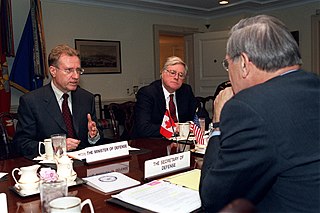A Quote by Michael Kergin
Thirty-five states have Canada as their largest export market. Let's say we get into a trade war with the United States - hopefully not, but let's say. Many states in the union are going to have trouble and more costs getting their stuff up to Canada. If we make the border a little thicker in terms of tariffs, and hit back, that will start to impact the states, in particular large business interests that are in Canada. And that starts to put indirect pressure on the White House.
Quote Topics
Back
Border
Business
Canada
Costs
Export
Five
Get
Getting
Going
Hit
Hopefully
Hopefully Not
House
Impact
Indirect
Interests
Large
Largest
Little
Make
Many
Market
More
Particular
Pressure
Put
Say
Start
Starts
States
Stuff
Tariffs
Terms
Thicker
Thirty
Thirty-Five
Trade
Trouble
Union
United
United States
Up
War
White
White House
Will
Related Quotes
Tariffs are in the end taxes. And somebody has to pay that tax. I think one thing people are forgetting is that trade disputes are two-sided. When the United States imposes tariffs on a partner like Canada, there is always a possibility that Canada will say that's not fair and retaliate. And at that point, you have to ask the question, - which U.S. industry will suffer because the Canadians retaliated against it?
The potential of Mexico, Canada and the United States is enormous. We have a combined population of half a billion people; peaceful trade-friendly borders that are the envy of the world; the prospect of energy independence is within reach and will change the geopolitical situation of United States; we do a trillion dollars in trade among the three countries; more than 18,000 American companies are involved in foreign direct investment in Mexico and Canada; an increasing number of Mexican companies are creating jobs in the United States.
Indeed, often because of the size and weight in the world of our neighbor, we in Canada often define ourselves in contrast to American positions on things like Cuba, the Vietnam War and nuclear disarmament. Historically, Canada has not always been aligned with the United States. It doesn't necessarily serve anyone's interests - Canadian or American - to be seen as an extension of the United States.
It does sound like a surprise, but it shouldn't be surprising. The Canada-U.S. trade relationship is still the world's largest. And a relationship that size always generates disputes. And this particular dispute on lumber tariff didn't fall out of a clear spring sky. It's been going on for literally decades. It's rooted in the different way Canada and the United States charges forestry companies for the trees that they cut down and turn into lumber.
Frankly, getting Mexico economically headed in the right direction with good energy policy - Canada, the United States, and Mexico have more known energy reserves than Saudi Arabia and Russia. So developing those and I think you'll see a major movement of people back into Mexico when that occurs when these prices get back. You're going to see a substantial development of the energy business in Mexico and Canada, domestic as well.
Canada is lacking two things. It's true. Don't make me say it again. The first is Olympic Heroes [...] The second thing that Canada is lacking is Memorial Day, which is today by the way, where we in the States celebrate our war heroes by having barbeques . And I realize here in Canada you can't have barbeques because you'd probably be attacked by a moose, or caribou, or even a grizzly.
Americans should never underestimate the constant pressure on Canada which the mere presence of the United States has produced. We're different people from you and we're different people because of you. Living next to you is in some ways like sleeping with an elephant. No matter how friendly and even-tempered is the beast, if I can call it that, one is effected by every twitch and grunt. It should not therefore be expected that this kind of nation, this Canada, should project itself as a mirror image of the United States.
The main problem, certainly, for the people who will not get vaccinated with Thimerosal, which was put into polio vaccine. And the belief was that it may cause autism. And there's been an awful lot done in terms of studies in Western Europe, Canada, the United States, and no correlation was found between Thimerosal and autism from those children who took vaccines. Indeed, when Thimerosal was taken out of many of these vaccines, the autism rate in the United States still rose.




























